
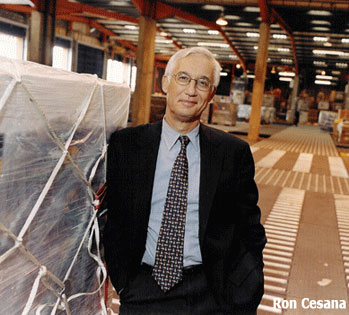 Whether
they agree with us or not, our readers know that Air Cargo News
FlyingTypers always tells it like it is. In our view, it is the
only way to stay relevant. Whether
they agree with us or not, our readers know that Air Cargo News
FlyingTypers always tells it like it is. In our view, it is the
only way to stay relevant.
The stated IATA Air Cargo proposition
is this:
“At WCS the focus remains on delivering
on promises to make a difference for the industry.”
In reality, those words, which seem so
positive upon first reading, are like a beautiful lady showing some
leg.
We are reminded of someone many of us
knew and respected who once used the analogy of a good speech to a miniskirt:
“It has to be long enough to cover
the essentials but short enough to keep your attention,” said
the late Ron Cesana at Cargo 2000, Dateline Toronto 2004.
Other than enumerating the topics IATA
naturally works on, we think everyone in air cargo would welcome particulars
concerning what tangible and measurable achievements and milestones
have occurred at these IATA-run World Cargo Symposiums that are directly
attributable to WCS.
Alongside any claims IATA might make there
should also be some comments and numbers gathered from the airline members’
perspective.
Specifics in this area would go a long
way in demonstrating the value of WCS.
We have been in this game long enough
to see quite a few industry trade shows. After 35 years of covering
air cargo, our ability to remember the details of more than a few of
them is pretty remarkable.
A look at the IATA Cargo Week 1994 agenda
in Singapore isn’t all that different than what we saw this week
at WCS 2010 in Vancouver!
So much that challenged air cargo 16 years
ago has morphed and grown with the changing times; we are living in
a different age, so why doesn’t anybody know what the hell is
going on?
What is disappointing, to say the least,
is the rise of hype and loss of hope and promise that IATA Cargo was
actually building their annual meetings into something new, progressive,
open, vital and different.
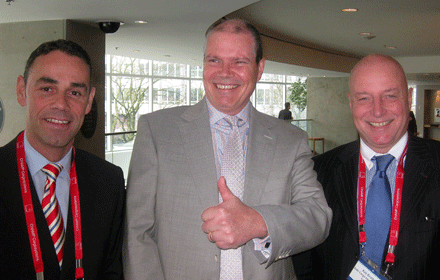 Why
are these men smiling? Why
are these men smiling?
When an innovative idea has a real
chance to become an industry standard the team votes thumbs up
as Lufthansa Charter Agency MD Reto Hunziger, Swiss World Cargo
MD Oliver Evans, Jade Cargo MD Capt. Kay Kratky celebrate the
40th anniversary since introduction of the ULD to air cargo at
World Cargo Symposium this week in Vancouver, Canada.
Recent announcement that Jettainer
and Lufthansa Cargo have tested and approved lightweight containers
created from innovative and lighter composites instead of aluminum
promise reduced weight, lowered fuel burn and less CO2 emissions
across the board a lighter, cleaner, better way to fly air cargo.
Now that’s a bounce in the
right direction.
Separately Capt. Kratky reports
that Jade Cargo which, (believe it or not) celebrates its first
half-decade in business, will arrive at the five-year mark come
August 2010.
Maybe just as good news is that
the Shenzhen-based carrier according to sources was profitable
during 2009.
|
For some years now, we have felt that
IATA, with all its power and influence, would be the best venue for
a great air cargo trade show.
We have reasoned that the organization
would also be able to create and deliver air cargo industry awards that
would ring as true barometers of the shining stars of this international
air cargo industry.
In both cases, based on this week in Vancouver,
we were wrong.
But the feeling here is that there is
still some hope that IATA could come through.
For example, our sources inside a special,
highly secret meeting among all the air cargo chieftains, a meeting
closed to the public and press at WCS this past Tuesday, report some
move toward outreach from IATA for advice and consent on many subjects,
including how to proceed to better serve air cargo.
If IATA is actually listening, that would
be a giant step and undoubtedly a positive opportunity for air cargo.
But others are not so sure.
“IATA continues to perfect the sham
of an industry trade association, while just having a thinly disguised
front to make money for themselves,” said a former highly placed
consultant to IATA who asked not to be identified.
“IATA managers perpetuate the good
lifestyle in Geneva and Montreal.
“What a disgrace.
“They take advantage of the fact
that the airlines are too busy surviving.”
We thought it a bit strange that during
the opening plenary, speakers entreated delegates of this World Cargo
Symposium IV to “seek more ways of supporting each other’s
efforts while just across the bay in Seattle the Airports Council International
was hosting its annual air cargo conference.
There was some imbalance with about 17
airports at IATA World Cargo Symposium and 16 at the ACI event.
So maybe IATA should step up and practice
some ‘hands across the water’ and bring ACI together with
WCS. Maybe delegates would be better served with having about three
dozen airports in the same place instead of having to try and figure
out how to be in two locations at the same time.
At the very least, these two mega organizations
could harmonize their schedules.
A curious wrinkle we noticed this week
at WCS in Vancouver: the single biggest group in attendance was IATA
people, although Director General Giovanni Bisignani didn’t make
the shape for the second year in a row.
Things happen, of course, but we cannot imagine the erstwhile DG dusting
such a large gathering of our passenger brethren at the airlines.
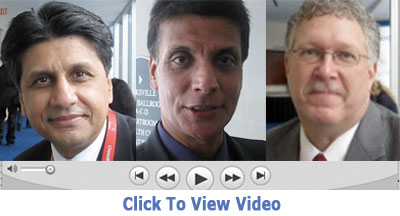 The IATA DG’s absence in Vancouver
and his rather tepid canned greeting looked even more out of step when
he appeared on the world press stage Thursday March 11 as WCS continued
announcing that now IATA thinks losses for 2010 would “ be about
half the original estimate or about $2.8 billion.”
The IATA DG’s absence in Vancouver
and his rather tepid canned greeting looked even more out of step when
he appeared on the world press stage Thursday March 11 as WCS continued
announcing that now IATA thinks losses for 2010 would “ be about
half the original estimate or about $2.8 billion.”
During WCS we saw IATA financial guru
Brian “Count de Money” Pearce scurrying from session
to session.
It is not hard to imagine that these new numbers were ready
to put out as the WCS Plenary took place two days prior to the DG's press
call from Geneva.
We think that IATA might
have brought wider attention to WCS by using the Vancouver venue for this breaking news
especially since air cargo (as usual) is leading the way toward
piloting commercial aviation into the black.
In any case, the standout attendance was
the aforementioned legions of people from IATA, many of whom seemed,
at times, to be pitching something to the attendees.
Add a few magazine people to the brew
and WCS networking interludes that were usurped for the purposes of
sales and marketing and it seemed like shooting fish in a barrel.
For now, let’s come down to the
ground and aim for airline cargo information exchange rather than focusing
on the lofty supply chain.
 The
big hot rumor at WCS that Des Vertannes, Head of Cargo at Etihad
is in line to succeed Aleks Popovich as Head of Cargo at IATA
apparently was a bag of wind. The
big hot rumor at WCS that Des Vertannes, Head of Cargo at Etihad
is in line to succeed Aleks Popovich as Head of Cargo at IATA
apparently was a bag of wind.
Aleks assured that the process to
find his successor was continuing and Des, who speaks in an up
front and thoughtful manner that is both reassuring and absolutely
delightful, said that his plan is to stay put at Etihad Cargo.
“Business is better but we
are looking for signs that things will continue on a positive
path including upcoming financial reports from Europe and elsewhere—connected
to mortgages and real estate values and other retail indicators.
“Air cargo should take a measured
approach and work even harder after a bloody rough year in 2009,
is my take on 2010.”
IATA should be so lucky to get this
guy.
|
We are more than willing to continue
this great journey of the IATA WCS as it has been described to us by
Head of Cargo Aleks Popovich, but we must be convinced that it is a
cause that truly serves the air cargo industry.
As a business, we understand financial
pressures all too well; as a non-profit trade association it must be
a very fine line to walk between putting the interests of the members
ahead of the Secretariat and meeting the IATA operating budget, particularly
when commercial events, activities and publications are needed.
Our opinion is that IATA is in a position
to make WCS credible and we hope at some point they finally rise to
the occasion!
But based on this week in Vancouver, we
can’t help but wonder:
As a Secretariat, what has IATA done to
relieve critical shortages in domain expertise at its member airlines
and how is this working?
The airlines have lost many knowledgeable
and experienced staff over the years and either they haven’t replaced
them or they have hired younger, cheaper, less experienced resources
and given them more work to do.
Efficiency is another no less critical
factor; in theory, the position a delegate takes at a meeting should
be in concert with the head of cargo or, sometimes, a cargo committee
member.
In the end, only the results of the conference
count – while a cargo committee can “direct”, it has
no real authority and can’t, for example, pass any resolutions,
as much as they might want to do so.
An oddity, but we are not here to discuss
governance.
What is being done by the IATA Secretariat
to ensure that this admittedly mundane internal process works as intended?
What must be done to facilitate that dialogue rather than having conference
bodies and cargo committees run on parallel tracks?
Is IATA providing consulting services
at competitive or discounted rates to alleviate airline expenditures
in this tough global economy?
IOSA registration as a condition of membership
is a good example; it is undoubtedly a good thing.
Is the service being provided at cost?
We look forward to a constructive dialogue.
Thanks IATA Cargo, for the memories and
a dream or two at WCS 2010.
You can depend on us to keep on firing
until we run out of bullets.
Geoffrey
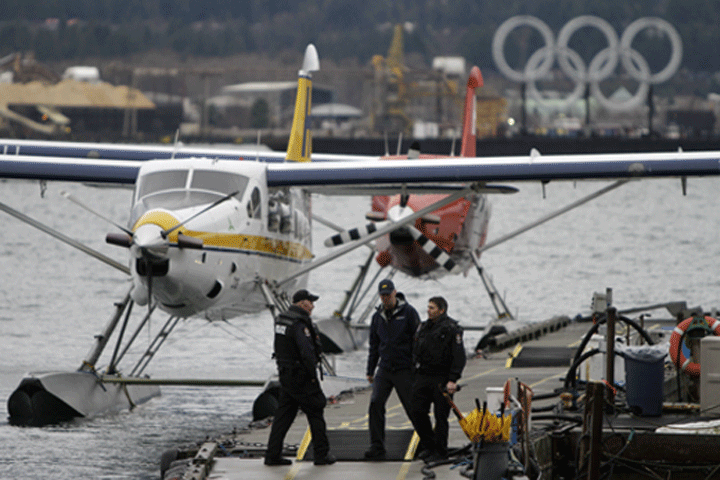
As IATA World Cargo Symposium wound down March 11 in Vancouver,
the Winter Olympics City prepared to host the 2010 Winter Paralympics.
Now security is again heightened for airlines serving both YVR
and several seaplane air taxi dockside operations with floatplanes
in evidence taking off and landing all day long. |
|





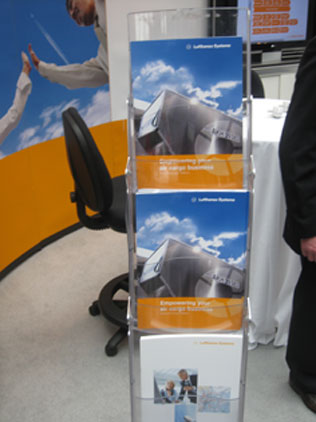
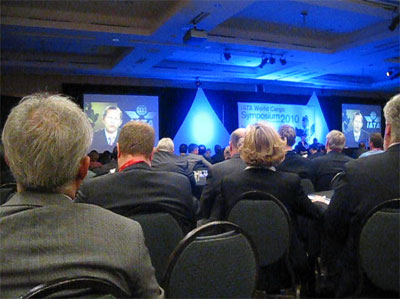
 The IATA DG’s absence in Vancouver
and his rather tepid canned greeting looked even more out of step when
he appeared on the world press stage Thursday March 11 as WCS continued
announcing that now IATA thinks losses for 2010 would “ be about
half the original estimate or about $2.8 billion.”
The IATA DG’s absence in Vancouver
and his rather tepid canned greeting looked even more out of step when
he appeared on the world press stage Thursday March 11 as WCS continued
announcing that now IATA thinks losses for 2010 would “ be about
half the original estimate or about $2.8 billion.”